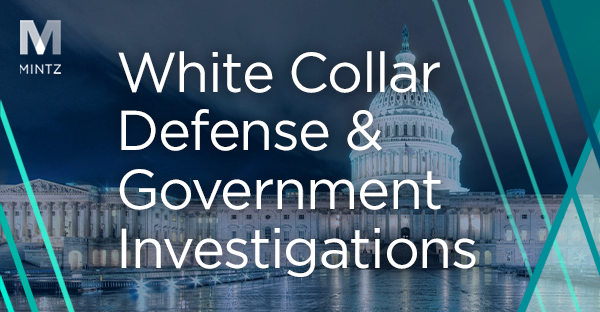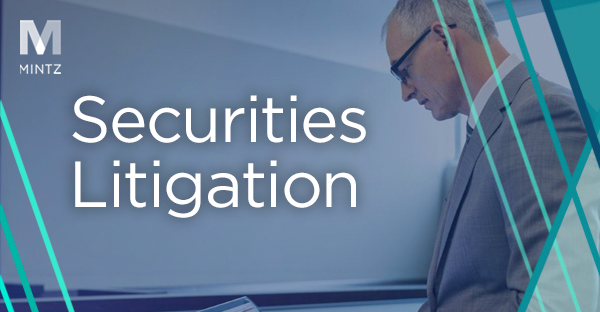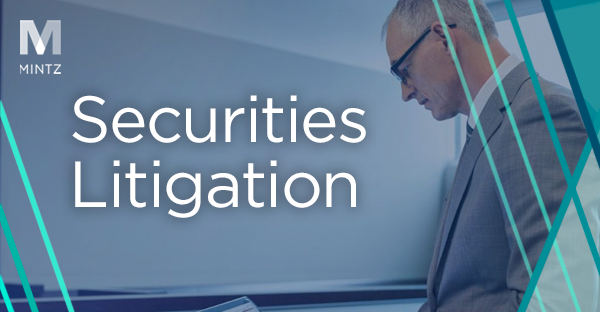
White Collar Defense & Government Investigations
Viewpoints
Filter by:
Cognitive Dissonance: State and Federal Enforcers’ Case Against Brain Health Dietary Supplement Due For Oral Arguments at the Second Circuit
February 20, 2026 | Blog | By Hope Foster, Robert Kidwell, Lexie Gallo-Cook, Samantha Kingsbury, Sherwet H. Witherington
Legal battle over Prevagen heads to the Second Circuit as FTC and NYAG dispute nationwide injunction, state authority, and standards for dietary supplement claims.
Iceberg Ahead! Top Massachusetts Federal Prosecutor Sounds the Alarm on the “Tip of the Iceberg” of PPP Fraud Prosecutions
February 13, 2026 | Blog | By Edmund P. Daley, Eoin Beirne, Nick A. LaPalme
DOJ and the U.S. Attorney’s Office for Massachusetts signal aggressive PPP and government program fraud enforcement. What can companies and decisionmakers do now.
DOJ Criminal Fraud Section 2025 Year in Review: Major Reorganization Confirms Shifting Enforcement Landscape
January 30, 2026 | Blog | By Eoin Beirne, Nick A. LaPalme
The Department of Justice's (DOJ or the Department) Criminal Fraud Section has undergone its most significant reorganization in years, according to its recently released 2025 Year in Review. Those changes and the current climate of enforcement uncertainty require more vigilance, not less, from corporate compliance and law departments.
Voluntary Self-Disclosure and Whistleblower Awards Initiatives Are Alive and Well in 2025: DOJ Issues White-Collar Enforcement Priorities for the New Administration
May 22, 2025 | Advisory | By Eoin Beirne, Nick A. LaPalme, Andrew Tucker Bobbitt
The first 120 days of the Trump administration have been characterized by dramatic changes in the realm of white-collar enforcement. Recently issued memoranda and policy guidance from DOJ contains critical details regarding the new administration’s enforcement priorities.
The Murky Waters of Wash Trading Digital Assets – DOJ Charges 18 Individuals and Entities
October 15, 2024 | Blog | By Eoin Beirne, Cory S. Flashner, Edmund P. Daley
The United States Attorney’s Office for the District of Massachusetts recently unsealed what it described as the “first-ever criminal charges against financial services firms for market manipulation and ‘wash trading’ in the cryptocurrency industry.”
DOJ Reinforces Emphasis on Voluntary Self-Disclosure With Latest Updates to the Evaluation of Corporate Compliance Programs Guidance
October 7, 2024 | | By Eoin Beirne, Nick A. LaPalme, Karen Lovitch
On September 23, 2024, the Criminal Division of the United States Department of Justice (“DOJ” or the “Department”) revised its Evaluation of Corporate Compliance Programs guidance (the “ECCP”). This article focuses on significant revisions detailed in the most recent installment of the guidance.
The New Private Equity Post-Acquisition Paradigm
October 1, 2024 | Alert | By Eoin Beirne
Read about DOJ recent scrutiny of private equity deals, its initiatives aimed at increasing acquirer oversight of M&A transactions, and best practices for private equity sponsors in the current enforcement landscape.
Supreme Court in Jarkesy Limits the SEC’s Powers to Use In-House Administrative Courts
June 28, 2024 | Blog | By Matthew Levitt, Patrick E. McDonough
Yesterday, the Supreme Court issued its decision in the closely-watched SEC v. Jarkesy, holding that the SEC could no longer seek civil monetary penalties for fraud in its in-house courts consistent with the Seventh Amendment, which grants the right to a jury trial and thus requires such cases to be heard in federal court. The Supreme Court’s decision has potentially profound implications, not only for the SEC’s regulation of the securities industry, but for dozens of federal administrative agencies that, depending on the authorizing statute, can or must impose civil penalties through administrative proceedings.
Massachusetts Attorney General’s Office Indicting Dental Providers for Fraud and Patient Harm. Behavioral Health Providers Are on Notice.
June 18, 2024 | Blog | By Eoin Beirne
True to their word in several recent public statements, the Chief and Deputy Chief of the Medicaid Fraud Division have brought several recent criminal cases against dentists for fraudulent billing and unlicensed practice of dentistry.
Acting U.S. Attorney Levy Forecasts False Claims Act COVID Cases Targeting Private Lenders Of CARES Act Loans That Failed In Their Obligation To Safeguard Government Funds
June 5, 2024 | Blog | By Eoin Beirne, Jane Haviland
Acting U.S. Attorney Joshua Levy discussed the enforcement priorities for the Massachusetts U.S. Attorney’s Office (USAO) during a Q&A session on May 29, 2024, and made clear that the historical focus of the office remains the top priority: detecting and combating health care fraud, waste, and abuse.
DOJ Announces it is Designing a Whistleblower Rewards Program
March 18, 2024 | Blog | By Eoin Beirne, Karen Lovitch , Brian Dunphy, Nick A. LaPalme
In early March 2024 at the American Bar Association’s 39th National Institute on White Collar Crime, Deputy Attorney General (DAG) Lisa Monaco’s keynote remarks previewed the development of new and significant Department of Justice (DOJ or the Department) policy initiatives. Her speech reemphasized many of DOJ’s key themes throughout the current administration, including individual accountability, the importance of strong corporate compliance programs, incentivizing voluntary self-disclosure of misconduct, and adapting to keep up with disruptive technologies such as artificial intelligence.
EnforceMintz — DOJ’s Efforts in 2023 to Incentivize Voluntary Self-Disclosure
February 8, 2024 | Blog | By Eoin Beirne, Nick A. LaPalme, Karen Lovitch
In 2023, DOJ announced significant updates to the Criminal Division’s Corporate Enforcement Policy, the agency’s Voluntary Self-Disclosure Policy for corporate criminal enforcement, and a new safe harbor for voluntary self-disclosures made in connection with M&A deals, all aimed at incentivizing companies to self-disclose their misconduct.
DOJ Announces New M&A Safe Harbor Policy
November 28, 2023 | Blog | By Eoin Beirne, Nick A. LaPalme
Throughout 2023, the Department of Justice has prioritized voluntary self-disclosure of misconduct. The introduction of the M&A Safe Harbor Policy extends these principles to mergers and acquisitions, emphasizing the pivotal role of effective compliance programs. White Collar Defense and Government Investigations Practice Co-chair Eoin Beirne and Associate Nick LaPalme present a high-level summary of the policy, offering valuable insights into its implications for companies navigating the complexities of mergers and acquisitions.
Health Law Diagnosed – EnforceMintz – Part 2: DOJ Regulatory and Policy Update
April 25, 2023 | Podcast | By Bridgette Keller, Eoin Beirne, Karen Lovitch , Brian Dunphy
In this episode, Health Care Enforcement Defense specialists Eoin Beirne, Karen Lovitch, and Brian Dunphy discuss key regulatory and policy updates issued by the DOJ and their potential impact on False Claims Act cases, from self-disclosure to privacy regulations.
Health Law Diagnosed – EnforceMintz: Analyzing Health Care False Claims Act Cases
April 18, 2023 | Podcast | By Bridgette Keller, Karen Lovitch , Brian Dunphy, Eoin Beirne
Bridgette Keller speaks with Karen Lovitch, Brian Dunphy, and Eoin Beirne about the Mintz Health Care Enforcement Defense Practice’s recent edition of the EnforceMintz newsletter, Analyzing Health Care False Claims Act Cases, and key health care enforcement trends.
DOJ Issues Voluntary Self-Disclosure Policy for All United States Attorney’s Offices
February 24, 2023 | Blog | By Eoin Beirne, Cory S. Flashner, Edmund P. Daley, Nick A. LaPalme
Garland Memo May Provide White Collar Defendants Increased Opportunity for Negotiation While Updated Corporate Enforcement Policy Highlights the Importance the Department of Justice Places on Self-Disclosure, Cooperation, and Remediation
February 2, 2023 | Blog | By Eoin Beirne, Edmund P. Daley, Nick A. LaPalme
On December 16, 2022, United States Attorney General Merrick Garland issued two related memoranda (collectively, the “Garland Memo”) which provide guidance to federal prosecutors regarding department policies for charging, pleas, and sentencing. Following publication of the Garland Memo, on January 17, 2023, Assistant Attorney General for the DOJ’s Criminal Division Kenneth Allen Polite Jr. announced important revisions to the Criminal Division’s Corporate Enforcement Policy (the “CEP”), which alter how it will evaluate corporate criminal matters.
Regulator Turf Battles & Twitter Sleuths - Takeaways from the insider trader tipping scheme against a former Coinbase Employee
July 22, 2022 | Blog | By Cory S. Flashner, Edmund P. Daley
Calls for strong US-based crypto regulation and leadership are growing after the U.S. Attorney for the Southern District of New York (SDNY) announced charges against three men in the "first ever cryptocurrency insider trader tipping scheme." The SEC's decision to charge the same three defendants with securities fraud could have broad implications beyond this case, classifying crypto assets traded on Coinbase as securities.
Explore Other Viewpoints:
- Data Centers & Digital Infrastructure
- AI: The Washington Report
- Antitrust and Federal Regulation
- Appellate
- Arbitration, Mediation & Alternate Dispute Resolution
- Artificial Intelligence
- Awards
- Bankruptcy & Restructuring
- California Land Use
- Cannabis
- Class Action
- Complex Commercial Litigation
- Construction
- Consumer Product Safety
- Corporate Governance (ESG)
- Cross-Border Asset Recovery
- DEI Legal Developments
- Debt Financing
- Direct Investing (M&A)
- Diversity
- EB-5 Financing
- Education & Nonprofits
- Employment
- EnforceMintz
- Environmental (ESG)
- Environmental Enforcement Defense
- Environmental Law
- Environmental, Social, and Corporate Governance (ESG)
- FDA Regulatory
- FDA in Flux
- False Claims Act
- Federal Circuit Appeals
- Financial Institution Litigation
- Government Law
- Growth Equity
- Health Care
- Health Care Compliance, Fraud and Abuse, & Regulatory Counseling
- Health Care Enforcement & Investigations
- Health Care Transactions
- Health Information Privacy & Security
- IP Due Diligence
- IPRs & Other Post Grant Proceedings
- Immigration
- Impacts of a New US Administration
- Insolvency & Creditor Rights Litigation
- Institutional Investor Class Action Recovery
- Insurance & Financial Services
- Insurance Consulting & Risk Management
- Insurance and Reinsurance Problem-Solving & Dispute Resolution
- Intellectual Property
- Investment Funds
- Israel
- Licensing & Technology Transactions
- Life Sciences
- Litigation & Investigations
- M&A Litigation
- ML Strategies
- Managed Care
- Medicare, Medicaid and Commercial Coverage & Reimbursement
- Mergers & Acquisitions
- Patent Litigation
- Patent Prosecution & Strategic Counseling
- Pharmacy Benefits and PBM Contracting
- Portfolio Companies
- Privacy & Cybersecurity
- Private Client
- Private Equity
- Pro Bono
- Probate & Fiduciary Litigation
- Products Liability & Complex Tort
- Projects & Infrastructure
- Public Finance
- Real Estate Litigation
- Real Estate Transactions
- Real Estate, Construction & Infrastructure
- Retail & Consumer Products
- Securities & Capital Markets
- Securities Litigation
- Social (ESG)
- Special Purpose Acquisition Company (SPACs)
- Sports & Entertainment
- State Attorneys General
- Strategic IP Monetization & Licensing
- Sustainable Energy & Infrastructure
- Tax
- Technology
- Technology, Communications & Media
- Technology, Communications & Media Litigation
- Trade Secrets
- Trademark & Copyright
- Trademark Litigation
- Unified Patent Court (UPC)
- Value-Based Care
- Venture Capital & Emerging Companies
- White Collar Defense & Government Investigations
- Women's Health and Technology








